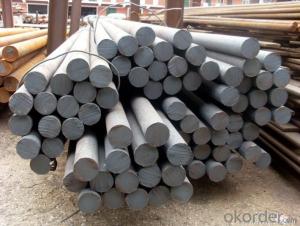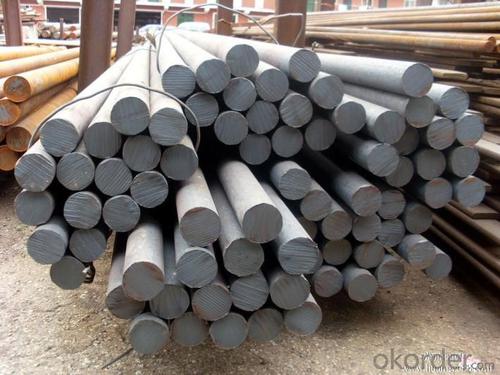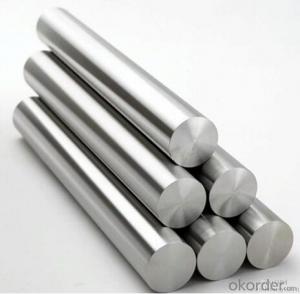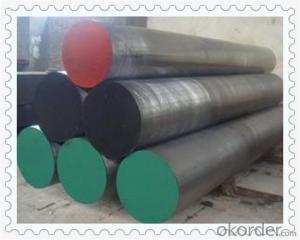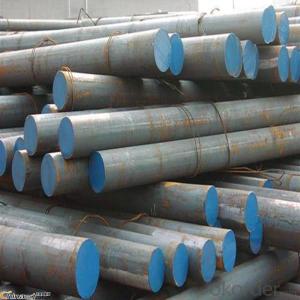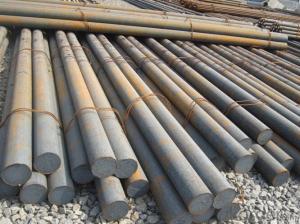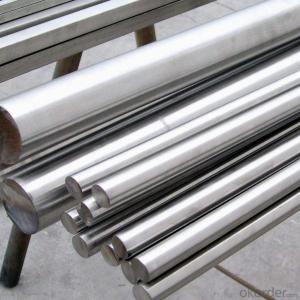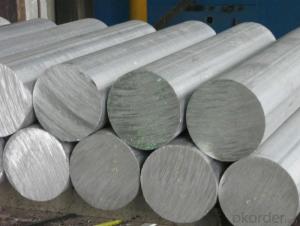SAE1045 4140 4340 8620 8640 Alloy Steel Bar
- Loading Port:
- China main port
- Payment Terms:
- TT or LC
- Min Order Qty:
- 25 m.t.
- Supply Capability:
- 10000 m.t./month
OKorder Service Pledge
OKorder Financial Service
You Might Also Like
Specification
The details of our Steel
1. Produce Standard: as the GB, AISI, ASTM, SAE, EN, BS, DIN, JIS Industry Standard
2. Produce processes: Smelt Iron -EAF smelt Billet - ESR smelt Billet -Hot rolled or forged get the steel round bar and plate
3. Heat treatment:Normalized / Annealed / Quenched+Tempered
4. Quality assurance:
All order we can received Third party inspection, You can let SGS, BV,.. and others test company test and inspect our products before Goods shipping.
Product information
Specification of S45C steel | |||
Round bar | Diameter(mm) | Length (mm) | |
100~300 | 2000~5800 | ||
Plate | Thickness(mm) | Width (mm) | Length (mm) |
20~70 | 105~610 | 2000~5800 | |
The specification can be customised! | |||
Heat treatment
1.Quench:1000-1040`C via 600`C and 850`C, preheating oil or wind cooling
2.Temper temperature should be higher than working temperature in order to stabilize the working size of mold
3.Heat up to 650°C of average temperature in order to eliminate the machined stress, 500 °c air cooling after electric cooker cooling
4.Tempering, 800-850 °c ,slow cooling after diathermia
5. Melting Process of SKD61 steel rod
Product show

Workshop show

- Q: What are the different methods of improving the creep resistance of special steel?
- There are several methods for improving the creep resistance of special steel. One approach is through alloying, where specific elements such as chromium, molybdenum, and tungsten are added to enhance the steel's creep resistance. Another method involves heat treatment processes such as annealing or quenching and tempering, which can refine the microstructure and increase the steel's resistance to creep deformation. Surface treatments like carburizing or nitriding can also be employed to improve the creep resistance of special steel. Furthermore, controlling the grain size and texture through techniques like grain refinement or grain boundary engineering can enhance the steel's resistance to creep. Finally, proper design considerations, such as reducing stress concentrations and optimizing component geometry, can also contribute to improving the creep resistance of special steel.
- Q: Can special steel be used in the defense sector?
- Yes, special steel can be used in the defense sector. Special steel alloys and compositions offer enhanced strength, hardness, corrosion resistance, and other desirable properties, making them suitable for various military applications. These include armor plating, missile casings, gun barrels, aircraft components, and naval vessels. Special steel's high performance and durability make it an important material in the defense sector.
- Q: What are the properties of alloy steel?
- Alloy steel possesses a combination of properties that make it highly versatile and desirable in various applications. It exhibits enhanced strength, hardness, and wear resistance due to the addition of alloying elements such as chromium, nickel, and molybdenum. Alloy steel can withstand high temperatures, making it suitable for use in elevated temperature environments. It also offers excellent corrosion resistance and is highly durable, making it ideal for applications that require long-term reliability. Additionally, alloy steel can be easily machined and fabricated, further adding to its appeal in various industries.
- Q: What are the different types of special steel?
- There are several types of special steel, including stainless steel, tool steel, alloy steel, and high-speed steel. Each type has unique properties and characteristics that make them suitable for specific applications. Stainless steel is corrosion-resistant and commonly used in kitchen utensils and construction materials. Tool steel is known for its hardness and used in cutting tools and dies. Alloy steel contains additional elements to enhance strength, toughness, and wear resistance, often used in automotive and construction industries. High-speed steel is designed to withstand high temperatures and used in cutting tools and drill bits.
- Q: How does special steel perform in high-pressure hydrogen environments?
- Special steel performs well in high-pressure hydrogen environments due to its high strength, corrosion resistance, and ability to withstand hydrogen embrittlement. It is designed to handle the extreme conditions associated with hydrogen, such as high temperatures and pressures, without compromising its structural integrity. Additionally, special steel alloys are often used in hydrogen storage systems, pipelines, and fuel cell components, demonstrating their reliability and effectiveness in such environments.
- Q: Can special steel be used in the production of medical implants?
- Medical implants can indeed utilize special steel materials. Examples of these special steels include stainless steel, titanium alloy, and cobalt-chromium alloy. These steels possess unique properties that make them suitable for medical purposes. Notably, they are biocompatible, meaning they do not cause any adverse reactions or toxicity within the human body. Additionally, they exhibit high strength, corrosion resistance, and the ability to withstand the harsh conditions found inside the human body. Consequently, special steels can be employed in the production of various medical implants, such as orthopedic implants like hip and knee replacements, dental implants, cardiac stents, and surgical instruments. By incorporating special steel into medical implants, durability, longevity, and biocompatibility are ensured, thus providing patients with a dependable choice to enhance their quality of life.
- Q: What are the different heat treatment defects in special steel?
- During the heat treatment process of special steel, various defects can occur. Some of the most frequently encountered defects are as follows: 1. Decarburization: This defect arises when the steel's outer layers lose carbon due to exposure to high temperatures in an environment rich in oxygen. The consequence of decarburization is reduced hardness and strength in the treated steel. 2. Quench cracking: Also known as cracking during quenching, this defect emerges when the steel undergoes rapid cooling subsequent to heating. The differential cooling rates can induce internal stresses, resulting in cracks within the material. 3. Distortion: Distortion refers to alterations in the shape or dimensions of the steel during the heat treatment process. It can be caused by uneven heating or cooling, inadequate fixturing, or improper quenching techniques. 4. Soft spots: Soft spots are localized areas of reduced hardness in the treated steel. These spots can occur due to insufficient heating or improper quenching, leading to diminished mechanical strength in those regions. 5. Overheating: Overheating is a defect that occurs when the steel is subjected to excessively high temperatures during the heat treatment process. This can lead to grain growth, reduced toughness, and overall decreased material properties. 6. Case hardening problems: Special steels often undergo case hardening processes, such as carburizing or nitriding, to create a hardened outer layer. However, several defects can arise during these processes, including inadequate or excessive hardening, poor case depth, or uneven distribution of hardness. 7. Residual stresses: Residual stresses are internal stresses that persist in the steel after the heat treatment process. If not properly controlled, these stresses can cause dimensional instability, warping, or even cracking. To prevent or minimize these heat treatment defects, it is crucial to adhere to proper heat treatment procedures. This includes precise temperature control, appropriate cooling rates, and suitable fixturing techniques. Furthermore, the use of high-quality heat treatment equipment, close monitoring of the process, and thorough inspections can aid in detecting and rectifying any potential defects in special steel.
- Q: How is alloy steel different from carbon steel?
- Alloy steel is different from carbon steel because it contains additional elements such as chromium, nickel, or molybdenum, which enhance its strength, hardness, and corrosion resistance. On the other hand, carbon steel mainly consists of iron and carbon, making it more malleable and less resistant to corrosion.
- Q: How does nitriding steel improve hardness and wear resistance?
- Nitriding steel improves hardness and wear resistance by introducing nitrogen into the steel's surface through a heat treatment process. This forms nitrides, which are hard compounds that increase the material's surface hardness. Additionally, the nitrogen atoms create compressive stresses within the structure, enhancing the material's resistance to wear and fatigue.
- Q: How does special steel contribute to product innovation?
- Product innovation is greatly influenced by the use of special steel, which offers various advantages. Firstly, special steel provides superior mechanical properties, including high strength, hardness, and wear resistance. These qualities permit designers and engineers to develop innovative products that can endure higher levels of stress, function in extreme conditions, and have extended lifespans. An excellent illustration of this is the aerospace industry, where special steel is frequently employed to manufacture lightweight yet robust components that enhance fuel efficiency and overall aircraft performance. Furthermore, special steel can be customized to possess specific attributes such as corrosion resistance, heat resistance, or magnetic properties. This enables the creation of groundbreaking products capable of operating in demanding environments like marine structures, power plants, or electronic devices. For instance, in the medical field, special stainless steel alloys are extensively used to produce implants and surgical instruments that are biocompatible, long-lasting, and resilient to rigorous sterilization processes. Additionally, special steel can be fabricated with precise dimensions and tolerances, facilitating intricate and complex designs. This fosters product innovation by allowing the production of intricate components such as gears, bearings, or turbine blades, which necessitate high precision and reliability. These advanced designs have the potential to enhance the efficiency, performance, and overall functionality of various products, ranging from automotive engines to wind turbines. Moreover, the versatility of special steel permits its combination with other materials, such as polymers or composites, to create hybrid products with unique properties. This opens up avenues for innovation in various industries, including automotive, construction, and consumer electronics. For example, special steel-reinforced concrete structures exhibit increased robustness and durability, while special steel-reinforced polymers enhance the strength and impact resistance of lightweight components. In conclusion, special steel contributes significantly to product innovation by offering enhanced mechanical properties, tailored characteristics, precise dimensions, and compatibility with other materials. These capabilities empower designers and engineers to develop innovative products with improved performance, durability, and functionality, thereby driving advancements across diverse industries.
Send your message to us
SAE1045 4140 4340 8620 8640 Alloy Steel Bar
- Loading Port:
- China main port
- Payment Terms:
- TT or LC
- Min Order Qty:
- 25 m.t.
- Supply Capability:
- 10000 m.t./month
OKorder Service Pledge
OKorder Financial Service
Similar products
Hot products
Hot Searches
Related keywords
